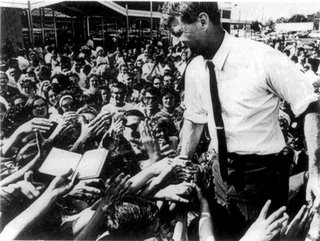What Sort of A Day Was It?

The news that Walter Cronkite died today at the age of 92 more than marked the end of a man's life. It was the end of an era. For those of us who grew up with a daily diet of Walter, he represented what was great about the press -- and what seems to be a fading shadow now.
Walter was credible, straightforward, and transparently clear. He was not sexy or even cute. His haircut looked like what your barber might give you. He had a wonderful, unique voice that came straight from his heart. He was a strong man working for a strong, young news organization.
Today, as we watch venerable old journalistic institutions crumble and others pander to baser tastes in a desperate grab for viewers or readers, he is a reminder of the glory days of his craft. And, importantly, he should be an inspiration for what its future could be.
Back in the 50's, on the grainy little black and white sets, Walter's "You Are There" program would always end with him declaring "What sort of day was it? A day like all days, filled with those events that alter and illuminate our times ... and you were there."
We were there. We'd like to be there again.
Labels: cronkite, ggcb, journalism








